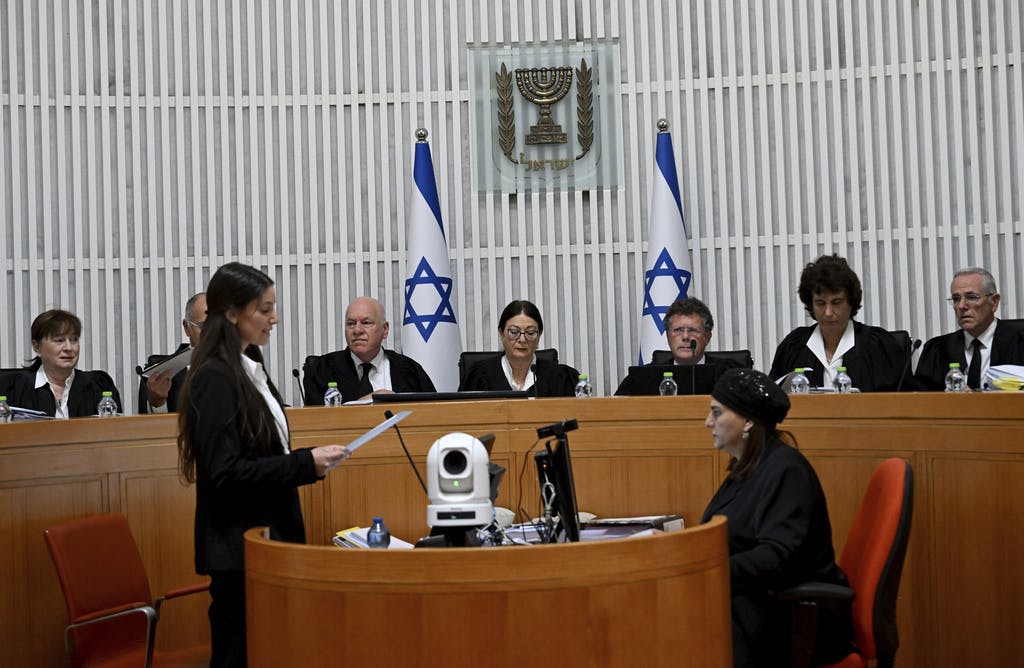Rosh Hashanah at Israel’s High Court
The top judges appear dug in against the Knesset and vice versa as the Jewish state prepares to welcome the year 5784.

On the eve of the Jewish New Year Israel is taking a short break from internal strife simmering since January, when Prime Minister Netanyahu’s government introduced proposals to rebalance relations between the branches of the country’s government. A time out is much needed following Tuesday’s unprecedented Supreme Court session. Divisions seemed as wide as ever, but are they? Our foreign editor, Benny Avni, who watched the proceedings, thinks not.
It was the first time ever that the 15 high court judges sat in a plenary session for a day-long hearing. It left Mr. Avni with the sense that they were leaning toward a way out of the impasse that for months has all but paralyzed the country. The dispute is between a government that argues that judges have appropriated too much power at the expense of elected legislators and opponents who fear curbing the court would be the “end of democracy.”
This week’s heated hearing was over petitions to strike down a “Basic Law” the Knesset passed in July. That law was designed to end the high court’s ability to strike down laws it deems “unreasonable.” To date, no Basic Law has been struck down by the high court, which has long seen such laws as a near equivalent of America’s constitutional clauses. The request that the court act to overturn a Basic Law has exposed raw nerves.
At one point during the 13 hour hearing — and it was plenty contentious — the government’s attorney, Ilan Bombach, asked the judges whether they could point to a legal authority that allows them to strike a Basic Law. Two conservative judges, Alex Stein and Yechiel Kasher, shot back, asking what gives the Knesset the authority to legislate Basic Laws. Thus, the nature, if not the source, of Israel’s dilemma came into focus.
There are those who would say this is the failure to enact a constitution — as was promised in Ben-Gurion’s very declaration of Israel’s independence in May 1948. Wars, the need to quickly build an economy, and disputes between orthodox and secular Jews — all those distractions prevented Israel’s founding fathers from agreeing on a parchment. Instead, one legislator, Yizhar Harari, proposed in 1950 that the Knesset would incrementally enact a set of Basic Laws.
The idea is that such laws would eventually add up to a kind of constitution. They nevertheless required but a simple majority in the Knesset. In America, just by way of contrast, the Constitution had to be ratified by nine of the 13 states. The American constitution ordains that the President and Vice President, and every officer, legislator, and judge of the national and state governments, is bound by oath to the Constitution.
In Israel, there are no rules defining what makes one law Basic and another less so. Nor is there any special oath binding the legislators and the judges to the Basic Law as passed by the Knesset. Now the top judges in the land are asked not only to strike down a Basic Law, but one that involves the high court itself. Some Likud members threaten to defy an adversarial court ruling, setting up in Israel what would be a constitutional crisis if they had a blasted constitution.
We suspect that some source of the turmoil Israel is going through has to do with political animosity, including even from some on the Israeli right, toward Mr. Netanyahu. Yet, the current fight is fundamental. There is an unresolved power struggle between the legislature and the judiciary. So is Israel more ready now than it was 75 years ago to unite over a written constitution that would lower these tensions?
The president of Israel, Isaac Herzog, who is the head of state but does not have executive or legislative power, piped up Wednesday to say that “there is a proposal before the parties that constitutes the basis for immediate understandings, which will preserve the State of Israel as a stable democracy.” The only problem is that Mr. Herzog wouldn’t say of what the proposal consists. To which we can but extend best wishes for a happy, healthy, prosperous New Year in 5784.

